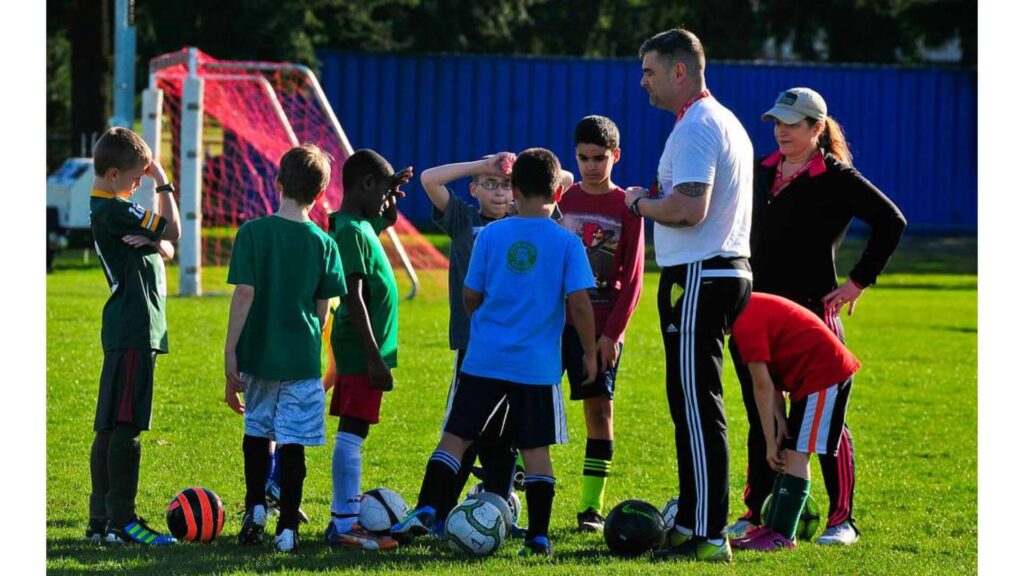Welcome to our in-depth exploration of sportsmanship in soccer, where we delve into the profound impact this virtue has on the beautiful game.
Soccer is more than just a sport; it encompasses values that transcend competition and unite players and fans alike.
In this article, we uncover the importance of sportsmanship, discuss its role in creating a positive soccer culture, and offer practical insights to foster sportsmanship in the game we love.
Let’s get started.
Table Of Contents
What is Sportsmanship?
Sportsmanship in soccer encompasses fair play, respect, and integrity. It’s about upholding the spirit of the game, respecting opponents and referees, and creating a positive and inclusive atmosphere on and off the pitch. It embodies the values that make soccer a beautiful and unifying sport.
1. The Power of Sportsmanship in Soccer
Sportsmanship forms the bedrock of soccer, encouraging fair play, respect, and camaraderie.
While winning is undoubtedly exhilarating, true champions also exhibit grace and integrity in both victory and defeat.
Soccer becomes a platform for athletes to showcase their skills and character, leaving a lasting impression on spectators and inspiring the next generation.
2. Embracing Fair Play
Fair play is the cornerstone of sportsmanship. Players must adhere to the laws of the game, displaying honesty and integrity in their actions.

From honouring the referee’s decisions to abstaining from diving or simulation, embracing fair play ensures a level playing field for all participants.
This fosters an atmosphere of trust, allowing the game to flourish unhindered.
==>>Also read: Do soccer players fake injuries?
3. Respect for Opponents
In soccer, respecting opponents goes beyond the pitch. Treating rivals with dignity, acknowledging their abilities, and appreciating their contribution to the sport is paramount.
The beauty of soccer lies in the diversity of playing styles and strategies, and respecting opponents allow for mutual growth and development.
A healthy rivalry can drive athletes to reach new heights, inspiring extraordinary performances.
4. Honouring the Referee’s Role
The referee, often a target for scrutiny and criticism, holds a pivotal position in maintaining order and fairness.
Respecting the referee’s decisions, even in challenging circumstances, is vital for upholding the spirit of sportsmanship.
Encouraging players to engage in constructive dialogue with the referee fosters mutual respect and creates an environment where decisions are accepted with grace.
5. Building a Positive Team Culture:
Sportsmanship extends beyond individual actions; it encompasses the collective spirit of a team.
Coaches play a crucial role in instilling values of fair play, respect, and teamwork in their players.

By encouraging a positive team culture, where players support and uplift each other, sportsmanship becomes ingrained in the fabric of the team. This not only enhances performance but also fosters lifelong friendships and memories.
We can read in Cohasset Soccer: “Referees have the authority to suspend play if a coach does not control his players and parents/supporters.”
6. Sportsmanship in the Stands
Sportsmanship is not limited to players and coaches but extends to the fans as well.
Spectators have the power to create an atmosphere that either fuels animosity or celebrates the sport in all its glory.
Cheering for great plays, applauding both teams and refraining from disrespectful behaviour are fundamental aspects of being a good fan.
A good example can be seen back in 2018 during a champion’s league game between Real Madrid and Juventus. C. Ronaldo scored a bicycle kick in Juventus stadium, and even Juventus fans applauded this genius.
When the stands exude sportsmanship, the entire experience becomes more enjoyable for everyone involved.
Good and Bad Sportsmanship in Soccer: Examples that Define the Game
Good Sportsmanship
Great sportsmanship in soccer embodies the values of fair play, respect, and integrity. Let’s explore some examples of good sportsmanship that demonstrate the positive impact it has on the game:
1. Helping an Injured Opponent:

When an opponent gets injured during a match, players from both teams may choose to put the game on hold to ensure their welfare.
Offering a helping hand, showing concern, and waiting for medical assistance exemplify the compassion and sportsmanship within the sport.
2. Applauding Exceptional Performance:
Even in the heat of competition, players who acknowledge and applaud remarkable plays by their opponents showcase a genuine respect for the game.
Applauding a well-executed goal or a skilful dribble demonstrates an appreciation for talent and the beauty of soccer/football.
3. Shaking Hands after the Game:
The post-match handshake between opposing players is a time-honoured tradition that symbolizes respect and good sportsmanship.
It’s an opportunity to acknowledge each other’s efforts, regardless of the result, and to leave any animosity on the field behind.
Bad Sportsmanship:
While good sportsmanship is ideal, instances of poor sportsmanship can also occur in soccer. Here are a few examples that illustrate behaviours to avoid:
1. Diving or Simulation:
In an attempt to deceive the referee and gain an unfair advantage, some players may dive or simulate injuries.
This behaviour not only undermines the integrity of the game but also fosters a culture of dishonesty and gamesmanship.
2. Disrespecting the Referee:
Arguing excessively with the referee, using offensive language, or questioning every decision undermines the authority of the official and creates a hostile environment.
Respect for the referee is crucial to maintaining order and fair play in soccer.
3. Taunting or Trash Talking:
Engaging in excessive taunting, insults, or derogatory remarks towards opponents not only displays poor sportsmanship but also detracts from the spirit of the game.
Soccer should be a platform for healthy competition and camaraderie, not a breeding ground for hostility.
By understanding the difference between good and bad sportsmanship, players, coaches, and fans can actively work towards fostering a positive soccer culture built on respect, fair play, and integrity.
In Summary
Sportsmanship is the lifeblood of soccer/football, breathing integrity, respect, and fair play into every match. Its impact extends far beyond the final score, leaving an indelible mark on the hearts of players and fans.
By embracing sportsmanship, we can shape a future where soccer is not just about competition but also about building character, fostering unity, and inspiring the world with the true essence of the beautiful game.
Remember, whether you’re a player, coach, referee, or fan, your actions matter.
Together, let’s champion sportsmanship in soccer and make a lasting difference that transcends the boundaries of the beautiful game.

